Drug Safety and Pharmacovigilance Professional Certification Program
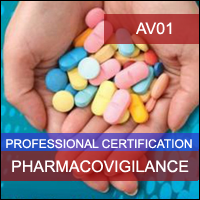 |
Price: $ |
Document your dedication to compliance, safety, and job performance by earning a professional certification.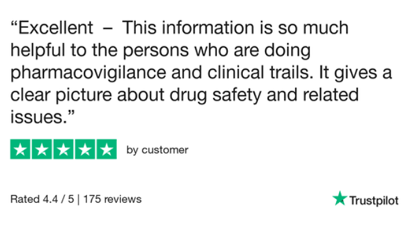 Training Provided By: Biopharma Institute Training Provided By: Biopharma InstituteWebsite: https://www.biopharmainstitute.com Outline/Syllabus: See individual course pages for outline. Description: This training program provides a comprehensive overview of the requirements and concepts necessary to attain a strong understanding of drug safety and pharmacovigilance. Drug safety monitoring and risk management are vitally important for medicinal product developers, license holders and clinical investigators. In addition to their duty to protect public health, increasingly tight regulation and potentially massive payments to litigants provide strong incentives for pharmaceutical and biotechnology companies to ensure that they maintain efficient systems for drug safety and good pharmacovigilance practice (GVP), so that all staff are aware of the basic requirements. This program will provide students with an overview of the most important aspects of this discipline, both before and after marketing of products, especially as they apply in Europe and the USA. The fundamental aim of drug safety assessment is to establish what adverse reactions may be caused by a medicinal product. Factors such as seriousness, severity, and frequency of reactions are then taken into account, along with the medical benefit of the drug, in establishing the benefit/risk profile of the product. Product license holders and regulatory authorities monitor the safety of licensed drugs to detect adverse reactions that are unexpected qualitatively or quantitatively and that alter benefit/risk balance, and they take risk minimization action as necessary. Such pharmacovigilance principally involves the identification and evaluation of safety signals in information obtained from a wide range of data sources. The methods used range from traditional medical assessment of individual spontaneous reports of adverse events, through 'data mining' of large databases, observational studies of 'real world' prescription and use, to interventional clinical trials. This program moves further to provide a guide to signal detection and management for approved products. The subject is presented as a process comprising four (4) stages: signal detection, signal validation, signal analysis and prioritization, and risk assessment and minimization. This online program aims to supply the student with a guide that will help them understand signal detection and the proper management of approved products. The process for this subject matter is presented in four stages: minimization and risk assessment; prioritization and signal analysis; signal validation; and signal detection. Interventional clinical trials, observational studies of prescription, and their use in the real world, data mining through large databases, and traditional medical assessment of individual spontaneous reports of adverse events, are some of the methods used. The fundamental aim of drug safety assessment is to establish what adverse reactions may be caused by a medicinal product. Factors such as seriousness, severity, and frequency of reactions are then taken into account, along with the medical benefit of the drug, in establishing the benefit/risk profile of the product. Proactive risk management is a major component of good pharmacovigilance practice (GVP). This course sets out the principles of risk management planning and outlines regulatory requirements for risk management plans in regions that are major markets for medicinal products. This program is based on a variety of sources, such as CIOMS IX, ICH E2E, EU GVPs, FDA guidance for the industry, and GVP Module V (Rev 2, 2017). In response to a safety signal, a regulatory action, called the Urgent Safety Restriction (USR), is taken. This action is intended to push an interim change to the marketing authorization's terms for a medicinal product in Europe. Described within this program are the procedures and principles for Urgent Safety Restrictions (USRs). Objectives contained within this area of the program are as follows: To train on what to do following a Urgent Safety Restriction, a specification for the requirements for a variation application is necessary; review an outline of the 24-hour procedure for a USR's execution; offer a description of general regulatory requirements for initiation and preparation of a USR; provide a description of the triggering of a USR; and to offer an explanation of the purpose of Europe's Urgent Safety Restrictions. This program moves on and explains the regulatory requirements for the reporting of adverse events and suspected adverse reactions in clinical trials. It describes how investigators should report to sponsors, and how sponsors should report to regulatory authorities and other stakeholders in the safety of investigational products. It explains how events are characterized as serious or non-serious, expected or unexpected, and it distinguishes the requirements for each category. It describes controlled vocabularies used for coding of events in reports. Furthermore, this program will set out the legal and regulatory requirements for safety reporting in clinical trials of medicinal products under the jurisdictions of the European Union and the USA. Pharmacoepidemiology is the study of the use and effects of drugs in large numbers of people. It provides a bridge between clinical pharmacology and epidemiology. The increasing demand for real-world evidence of the safety, efficacy and utility of medicinal products has focused greater attention on pharmacoepidemiological research. This program details the process of planning and conducting such research, and analyzing and reporting the findings, to follow good pharmacoepidemiology practice. Individual courses contained within this program are as follows: 1) Introduction to Drug Safety and Pharmacovigilance; 2) Urgent Safety Restrictions; 3) Risk Management Planning for Medicinal Products; 4) Signal Detection and Management in the Pharmacovigilance; 5) Good Pharmacoepidemiology Practice; 6) Safety Reporting in Clinical Trials (Adverse Event Reporting); and 7) Clinical Trial Safety Reporting Requirements in the EU and USA.
|
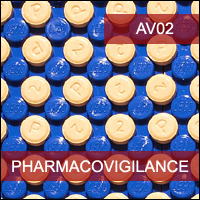 | Introduction to Drug Safety and PharmacovigilanceCourse ID: AV02Duration: 180 minutes (2 CPD Credits) Price: Included |
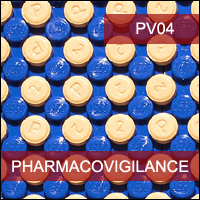 | Drug Safety: Signal Detection and Management in PharmacovigilanceCourse ID: PV04Duration: 90 minutes (1.5 CPD Credits) Price: Included |
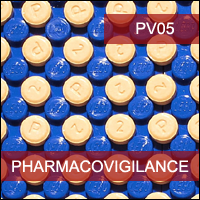 | Drug Safety: Risk Management Planning for Medicinal ProductsCourse ID: PV05Duration: 90 minutes (1.25 CPD Credits) Price: Included |
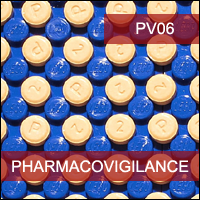 | Drug Safety: Urgent Safety RestrictionsCourse ID: PV06Duration: 45 minutes (0.75 CPD Credits) Price: Included |
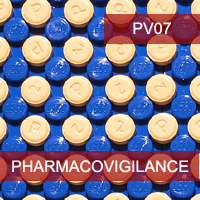 | Drug Safety: Good Pharmacoepidemiology PracticeCourse ID: PV07Duration: 60 minutes (1 CPD Credits) Price: Included |
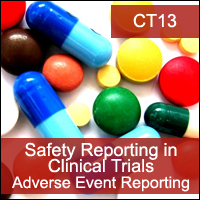 | Safety Reporting in Clinical Trials (Adverse Event Reporting)Course ID: CT13Duration: 120 minutes (2 CPD Credits) Price: Included |
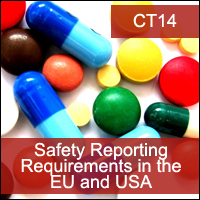 | Clinical Trial Safety Reporting Requirements in the EU and USACourse ID: CT14Duration: 120 minutes (2 CPD Credits) Price: Included |
Additional Information:
Certification Requirements: Students must view the entire program and successfully pass an online, multiple-choice final assessment for each course within a 12-month period. Certificate of completion is accessible in PDF format immediately after satisfying the requirements.
Biopharma Institute's online training courses include immediate access after enrollment. Username, password, and instructions are emailed to the student directly following online enrollment into the program. Course takers may attempt the final assessment any number of times, as needed, to achieve a passing score.
Once all training requirements have been satisfied a professional certification has been achieved and can be verified immediately from our website using a unique ID code located on the certificate. The professional certificate of completion is also instantaneously launched and made available to the student in a PDF format. Certificates are issued in an encrypted PDF format, and include a watermark, unique validation code, and QR verification barcode. Furthermore, a digital badge is also issued. The digital badge documents all the courses taken and completed within the program, to further validate the student's achievement. Digital badges can be displayed on social networking sites, such as LinkedIn, Facebook, Badgr, and others, to display accomplishments.
Biopharma Institute certificates and digital badges include the date of completion, but do not have an expiration date. However, compliance training is typically considered valid for a period of 3 years. Many organizations suggest that compliance training should be refreshed at least every three years to stay up to date with regulations, standards, guidelines, and to reinforce the importance of maintaining compliance. The validity or recertification period for employee compliance training would be determined by those responsible for managing quality within the company.
Benefits of Being Certified from Biopharma Institute: Throughout our training students will be engaging in active learning using interactive eLearning modules validated by 3rd party organizations for relevancy, compliance, and regulatory content. Courses are developed by subject matter experts (SMEs) and instructional design professionals with the goal to promote the students' retaining of key knowledge. The programs further offer access to regulatory references, real-life case studies, and introduce other important information necessary to assist with learning. Since 2003, Biopharma Institute has been aiding both professionals and their corporate employers with fulfilling training requirements. Biopharma Institute's certifications are recognized by a wide spectrum of industries, regulators, and companies around the world. Furthermore, our training solutions are customizable to any organization's training needs. Today, Biopharma Institute offers over 300 courses training on clinical research, drug manufacturing (cGMP), regulatory affairs, validation systems, pharmacovigilance, good laboratory practice (GLP), and data integrity. We supply our training to clinical research, pharmaceutical, and medical device industries.
Employee / Corporate Training: For corporations seeking a method to train employees, economically, without having to set aside time for travel, webinars, or live, in-person training; Biopharma Institute is the training partner you can rely on. Our training provides an effective, engaging, self-paced learning experience which fits conveniently into the day-to-day activities of most types of learners. Our eLearning modules are SCORM-compliant and can be delivered from most corporate learning management systems (LMS). We catering to both small-scale and large-scale training requests, with the same goal in mind: To make this a good experience for everyone involved, from the students to those managing the group training.
Use our Search Form to Find What You're Looking For:
Benefits of Training with Biopharma Institute
| Immediate access to courses: | Username, password, instructions, and receipt of payment are immediately emailed upon online enrollment. |
| Self-paced, asynchronous eLearning: | 24/7 access to all course materials and assessments for 12 months. |
| Open enrollment: | No prior course prerequisites or work experience required. |
| Expertise: | Courses developed by subject matter experts (SMEs) in the area being taught. |
| Current and validated: | Training is current with respect to regulations, procedures, and 3rd party validated and/or accredited. |
| Optimized for learning: | Courses include voiceovers, easy navigation, reading materials, case studies, progress checks, and high-quality animations to increase retention of subject matter. |
| Secure and safe access: | Encrypted website and LMS connections, firewall, and daily malware scans deliver optimal security and performance. |
| Flexible final assessments: | Multiple-choice questions can be taken repeatedly until a passing score is achieved. |
| Direct access to certificates: | Upon completion, certificates are immediately issued in an encrypted PDF format. Certificates include a watermark, unique validation code, and QR verification barcode. |
| Verification of training: | Certificates are verifiable online using QR barcode or the unique ID code. Digital badges are additionally issued for all professional certification programs. |
| Training manager access: | A proprietary portal offers access to download enrollment reports, training records, account balance, and more. |
| SCORM-compliant courses: | Courses can be delivered directly to most corporate Learning Management Systems (LMS). |
| Purchase orders (POs): | POs are accepted from all companies. Request an invoice when starting the procurement process. |
| Reimbursement: | Some employers may reimburse their employees for training expenses. Check your company's policy. |
| Financial assistance: | Payment plans are available to those who qualify. Alternatively, purchasing individual courses one at a time is also an option. |
| Career advancement: | Professional certifications help demonstrate interest and dedication to career and job performance. They may be helpful for those seeking to grow their career or transitioning to a different position within an organization. Professional certifications are a great addition to a resume, offer talking points for the interview, and practical knowledge for performing duties. |
Have Questions? Contact Us:
Use the form below if you would like more information on our programs. You may want to request a quote on group training or an invoice for generating a company purchase order. For quotes or invoices please provide the course(s) and number of students. Alternatively, call toll-free from the US or Canada: +1 (888) 424-6576. International callers may dial: +1 (201) 301-8370.

 Download
Download 




